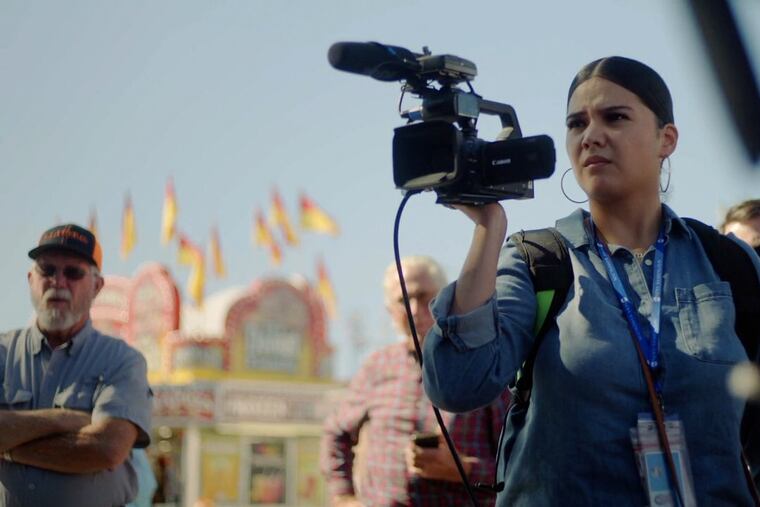The world according to Abby Cruz
Philadelphia native and Latina journalist Abby Cruz is featured on the Hulu docuseries, Power Trip, a behind-the-scenes look at political campaigns. A new episode drops on Sunday.

Key 1: Tough times don’t last; tough people do
ABC’s Race & Culture reporter Abby Cruz didn’t have an easy childhood growing up in North Philadelphia, so she developed what she now calls keys for turning lemons into lemonade.
Those keys also unlocked her latest career coup: participating in the George Stephanopoulos produced eight-part docuseries Power Trip: Those Who Seek Power and Those Who Chase Them airing Sundays on Hulu, where ABC News goes behind its own scenes to show the effort it takes for seven of its newest reporters to cover this year’s midterm elections.
ABC News has long used embeds, campaign reporters who become embedded in a campaign, to help cover presidential elections, but this is the first time they have been used for a midterm election. Power Trip follows the embeds as they do the grunt work to get the stories.
“We are boots on the ground and give behind the scenes access,” Cruz explained.
Raised in North Philadelphia, Cruz said “I like to tell people that Kensington made me, and Logan raised me.” Both neighborhoods were gritty and dangerous, but Cruz insisted that’s what made her tough.
And toughness, as she told her audience during her 2020 TED Talk — ”Seizing Your Opportunity” — is one of her keys to making it.
Key 2: Trust in your struggle
Yet nothing in Abby Cruz’s life suggested she would make it.
“My name is Abby Cruz. I’m with ABC News in Washington, D.C. I’m also a committee member with the National Press Club,” she explained during the TED Talk. “But forget about all that for one second because this, right here, is a dream come true.”
Her reality was more nightmarish.
Cruz’s mother took her away from her grandmother, who had raised her in Logan until she was 8 years old, in an attempt at a second chance at mothering but became physically abusive. Her father was completely absent.
In her mother’s Kensington rowhouse, Cruz remembered, “That’s when hell started again. Every time my mom would see me, she puts her hands on me. Every time she was angry, I’m getting it. She just did not like seeing my face.”
Eventually, her mother evicted her from the house, and she went to live with her best friend. At 15, she left and didn’t look back.
School, however, was another world. She attended Conwell Middle Magnet School and then was steered by an instructor to the academically challenging Philadelphia High School for Girls. Finishing La Salle University made her the first college graduate in her family.
But pity is not what Cruz wants people to draw from her talk about her childhood experiences. She wants people to know that the second key to success is to embrace your own fight. Cruz believes you have to have a I’m-ready-to die-for-this-opportunity attitude to seize the day.
And she wants you to know when you seize the day, nightmares fade, and dreams come true.
Key 3: Light at the end of the tunnel
Cruz knew she wanted out of North Philadelphia, and she knew she wanted to be a reporter. She just didn’t know how to make either of those happen. “I was always so hungry and determined. I wanted to make it out so bad,” she said.
During her freshman year in college, Cruz received a call from the Department of Human Services that resulted in her becoming the legal guardian for her two younger sisters, ages 13 and 6. So her life became parenthood along with a full-time job and a full-time school load.
Cruz credits her favorite uncle, Alberto Torres or De$oney (pronounced De-money), with igniting her love of newspapers as they read The Inquirer want ads together to help him search for jobs. She credits the Daily News for her first internship and allowing her to search the streets for stories. On Feb, 17, 2015, Cruz’s first article was published — on a man who sold his popular carrot cakes in the subway after misfortune struck and he had to shutter his brick-and-mortar store.
It showed what is becoming a Cruz specialty — authentic stories about real and resilient people in tough situations.
The story was a newsroom hit and it started her upward reporter’s climb. Eventually, her newspaper mentors urged her to leave the city.
She told her TED Talk audience that sometimes seizing the opportunity means listening to people giving you genuine advice. She opted to go to D.C. but had no job and no place to live. However, her 2018 freelance coverage of the March for Our Lives student-led protest in wake of the massacre at Marjory Stoneman Douglas High School in Parkland, Fla., brought her work to the attention of Reuters, BBC, and ABC News.
And when ABC News offered to pay her for some photos, she countered with a request for employment. In 2019, she became a desk assistant.
“A desk assistant, it’s an entry level job but I was thankful for my opportunity. I started to pitch my own stories. It doesn’t matter about the title. It matters the role you are going to play,” Cruz said.
Cruz, who now lives in D.C., called from her temporary home in the Dallas-Fort Worth area because ABC News assigned her Texas and Nevada. Uncharacteristically, Cruz doubted her readiness for the docuseries and thought being an embed would be too difficult for a reporter with no political experience.
When she asked Stephanopoulos for help, he told her that every story eventually intersects with politics. “Thank God for him giving me that advice because once he gave me that information, I was fearless. He made it so simple. And the cherry on top — if I ever have an issue, he is one phone call away.”